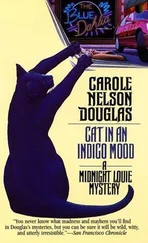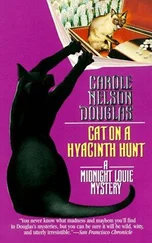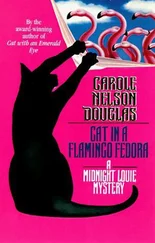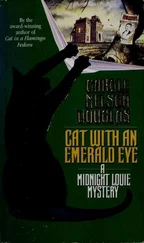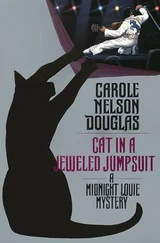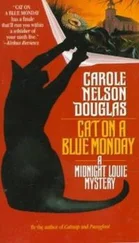Unknown - Douglas_Carole_Nelson_Cat_in_a_Jeweled_Jumpsuit_Bo
Здесь есть возможность читать онлайн «Unknown - Douglas_Carole_Nelson_Cat_in_a_Jeweled_Jumpsuit_Bo» весь текст электронной книги совершенно бесплатно (целиком полную версию без сокращений). В некоторых случаях можно слушать аудио, скачать через торрент в формате fb2 и присутствует краткое содержание. Жанр: Старинная литература, на английском языке. Описание произведения, (предисловие) а так же отзывы посетителей доступны на портале библиотеки ЛибКат.
- Название:Douglas_Carole_Nelson_Cat_in_a_Jeweled_Jumpsuit_Bo
- Автор:
- Жанр:
- Год:неизвестен
- ISBN:нет данных
- Рейтинг книги:5 / 5. Голосов: 1
-
Избранное:Добавить в избранное
- Отзывы:
-
Ваша оценка:
- 100
- 1
- 2
- 3
- 4
- 5
Douglas_Carole_Nelson_Cat_in_a_Jeweled_Jumpsuit_Bo: краткое содержание, описание и аннотация
Предлагаем к чтению аннотацию, описание, краткое содержание или предисловие (зависит от того, что написал сам автор книги «Douglas_Carole_Nelson_Cat_in_a_Jeweled_Jumpsuit_Bo»). Если вы не нашли необходимую информацию о книге — напишите в комментариях, мы постараемся отыскать её.
Douglas_Carole_Nelson_Cat_in_a_Jeweled_Jumpsuit_Bo — читать онлайн бесплатно полную книгу (весь текст) целиком
Ниже представлен текст книги, разбитый по страницам. Система сохранения места последней прочитанной страницы, позволяет с удобством читать онлайн бесплатно книгу «Douglas_Carole_Nelson_Cat_in_a_Jeweled_Jumpsuit_Bo», без необходимости каждый раз заново искать на чём Вы остановились. Поставьте закладку, и сможете в любой момент перейти на страницу, на которой закончили чтение.
Интервал:
Закладка:
In 1994, I was asked to edit a collection of stories about Marilyn Monroe. Marilyn left me as cold as Elvis, but I dutifully delved into the mountains of Marilyn books. I even included my take on M. M., a dramatic monologue about what Marilyn would be doing at age seventy if she had survived: debuting on Broadway. Soon I found myself dusting off my long-shelved performing skills (theater was my college major) to don M. M. “drag.” I not only delivered the monologue buton occasion answered questions and related to crowds in the M. M. persona. Moonlighting as a Marilyn impersonator enlightened me enough to finally confront Elvis impersonators, the Elvis phenomenon, and the even greater mountain of books on them both.
Every writer becomes an actor, getting into characters’ heads, thinking like them, feeling for them. Any writer who deals with historical personalities becomes a kind of psychic channeler. Eerie how much you come to know about that person beyond mere fact. It happened to me with Oscar Wilde. In a short story, I named his favorite painting, my pure invention. A new, exhaustive Wilde biography was published soon after (as they are every couple years). Two of his favorite paintings were pictured, including the one I’d cited. My prescience was no mystery; the painting was of a religious subject with latent homosexual erotic appeal. I knew my time period, my art history, human psychology, Wilde’s writings and biography, and therefore my man.
I never knew Elvis or wanted to. It’s not a pleasant process, investigating stunted lives and early deaths. Like a forensic psychologist, a writer reading about such icons’ hyperbolic lives can’t help wondering what, if anything, would have made a difference to the tragic decline that followed fame. What would have saved Elvis (or Marilyn)? Who killed Elvis (or Marilyn)? I wasn’t intrigued in a literal sense, because I concluded neither death was murder, but by the paradox that success so often breeds self-destruction.
Elvis’ life and death is an object lesson in the perils of peaking early. Before he was eighteen, he experienced two intensely emotional elements in his life that nothing else could ever duplicate: a singular connection to his mother, an extended and symbiotic twinship, and the artistic and erotic euphoria of a performing charisma that drove his audiences to frenzy. His mother died when he was twenty-three. Nine years of movie-making surgically separated him from his live audiences. Fame and fortune forced him into isolation from overwhelming fan adulation and death threats. Nine years of a return to the manic-depressive performer’s emotional seesaw brought him from career rebirth and comeback triumph to a drug-assisted decline and death.
Compare how Elvis and Marilyn were alike: Both were self-made bluecollar heroes Both stuttered Both scorned underwear Both had birth certificate misspellings of their middle names (Norma Jeane/Jean; Elvis Aron/Aaron) Both were overmedicated by doctors Both created iconic personas that were perpetuated by impersonators and massive merchandising Both rebelled against the sexual hypocrisy of the fifties Both sought to be taken “seriously” as actors; Marilyn fought for and got better films Both were dominated by soulless money men who stifled their potential and careers
The best book about Elvis is Peter Guralnick’s two-volume biography. The Last Train to Memphis relates Elvis’s phenomenal rise up till 1958, when his mother died and the draft interrupted his career, sending him to Germany as an army private. John Lennon later said that Elvis died when he went to Germany. Careless Love is subtitled “The Unmaking of Elvis Presley” and covers the twenty-year period after Elvis returned to the United States until his shocking death at the age of forty-two.
Guralnick’s books cite the few useful parts of the many memoirs that focus on Elvis’s failings and extreme behaviors, and also convey the inborn personal charm and the performance charisma that Elvis cultivated shrewdly before the sheer weight of his popularity (andtherefore power) overcame even his remarkable gifts. The Inner Elvis by Peter Whitmer, Ph.D., explores the pathology of a surviving twin and identifies Elvis as an abused child whose “lethal enmeshment” by a doting and domineering parent, his mother Gladys, doomed him to the fate he found. P. F. Kluge’s novel, Biggest Elvis, about Elvis impersonators in Guam, is moving and insightful. Gilbert B. Rodman’s Elvis After Elvis makes a scholarly case for Elvis single-handedly creating the climate for the sixties’ social revolution: youth culture, the protest movement for civil rights and against Vietnam, the sexual revolution and gay rights, and ultimately, the resurgence of feminism that resulted from all the preceding.
Reading many of the dozens of books about a pop icon like Elvis is like listening to conflicting yet buttressing testimony from an endless parade of witnesses in a legal case. You must strain fact from self-serving faction. You read details about the prescription medication dosages, the autopsy, and the theoretical causes of death; you consider forensic psychology and testimony of interested and disinterested parties. You eventually distill the flood of facts and opinions into a theory of your own.
Here’s mine: both nature and nurture created and destroyed Elvis Presley. His extended family of aunts, uncles, and cousins had what is now recognized as a genetic disposition to the disease of alcoholism. His mother was never autopsied, and her death at age forty-six was attributed to liver disease, but it is thought to have been cirrhosis of the liver. She certainly drank in her last years. The headstone Elvis put on her grave reads “She was the Sunshine of our Home,” and during Elvis’s youth she was described as musical and fun-loving, although possessed of a frying-pan-throwing temperament. Photos of Elvis with his parents as his fame grew show a somber, tender symbiosis: Elvis and Gladys always focusing on and touching each other; Vernon a tangential figure on the fringe of this consuming bond. But Gladys’s eyes are ringed with unhealthy black, her expression is dead (or dazed by alcohol). She is not a well or happy woman. Her cherished son’s meteoric rise, her loss of contact and control as he was swept away in a fever of touring and publicity and screaming girl groupies, coincided with her decline and death.
Wisely, Elvis disliked and avoided liquor, except for brief experimental periods, and disdained “recreational” drug use even as he escalated into massive doses of prescribed uppers and downers. He had no more knowledge than anybody then of the addictive dangers of mood-altering medications. He educated himself in the medications’ side effects so he could prescribe for himself with authority. The seeds of his psychological and physical downfall were not only genetic and familial, but rooted so early in his performing career as to make his “unmaking” inevitable, which is where the word “tragic” enters his saga.
Because of lifelong sleeping problems, including nightmares and sleepwalking incidents, he slept with his mother until the age of twelve. He had never slept away from home until he went on the road in his late teens, to perform. This extended maternal closeness drove him into a confused sexuality: women he became truly close to became mothers, and the sexual side of the relationship became nurture and caretaking rather than passionate. Elvis always had “other women,” often actresses or groupies, whom he pursued for shallow sexuality, but were more often needed as bedtime companions rather than lovers.
Through many books, the first reference I found to his using “uppers” was when he was given Dexedrine by other soldiers to stay awake on night guard duty in Germany. He came home with massive jars of the pills for the whole entourage. Although he’d made a few movies by then, Hollywood’s tendency to medicate stars doesn’t seem to be the culprit in his case. Then I found a referenceto Gladys, self-conscious at the media attention Elvis’s stardom drew to her. She took diet pills and Elvis borrowed them at the very brink of his career. Diet pills then were amphetamines, “speed” prescribed readily by family doctors. They depressed the appetite center in the brain, which also interfered with the sleep center. They make you sleepless, but give you energy to burn. Minds on speed will run in creative circles, inventing all sorts of ambitious projects, but the impulse rarely produces anything concrete. When the effect wears off after a few weeks, takers need to increase the dosage to get the same effect.
Читать дальшеИнтервал:
Закладка:
Похожие книги на «Douglas_Carole_Nelson_Cat_in_a_Jeweled_Jumpsuit_Bo»
Представляем Вашему вниманию похожие книги на «Douglas_Carole_Nelson_Cat_in_a_Jeweled_Jumpsuit_Bo» списком для выбора. Мы отобрали схожую по названию и смыслу литературу в надежде предоставить читателям больше вариантов отыскать новые, интересные, ещё непрочитанные произведения.
Обсуждение, отзывы о книге «Douglas_Carole_Nelson_Cat_in_a_Jeweled_Jumpsuit_Bo» и просто собственные мнения читателей. Оставьте ваши комментарии, напишите, что Вы думаете о произведении, его смысле или главных героях. Укажите что конкретно понравилось, а что нет, и почему Вы так считаете.

